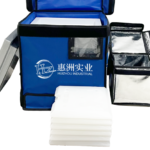Farm-to-Table Dry Ice Pack Sheet: How to Maintain Freshness in Every Delivery
Introduction
Ensuring the quality and freshness of perishable items in the farm-to-table movement is a challenge. One of the most efficient methods for guaranteeing the integrity of food during transportation is using dry ice pack sheets. These sheets maintain the required temperature during transit, ensuring that delicate products like meats, seafood, and fresh produce arrive at their destination in optimal condition. This article delves into the role of dry ice pack sheets, explaining how they work, their benefits, and best practices for usage in the cold chain logistics of farm-to-table deliveries.
-
What exactly are farm-to-table dry ice pack sheets and why are they essential for food deliveries?
-
How do dry ice pack sheets function to maintain freshness?
-
What are the best practices for using dry ice sheets during farm-to-table shipping?
-
How do you select the appropriate dry ice pack sheet for your shipments?
-
What are the latest innovations in temperature-controlled shipping solutions?
What Are Farm-to-Table Dry Ice Pack Sheets?
Farm-to-table dry ice pack sheets are a type of cooling agent that uses solid carbon dioxide to maintain the required low temperatures for perishable products during shipping. Unlike regular ice, which melts and can leave moisture behind, dry ice sublimates, turning from a solid directly into a gas at -78.5°C. This means no excess water is left behind, preventing soggy packaging and the potential spoilage that comes with melted ice. These dry ice sheets are perfect for preserving the freshness of meats, seafood, dairy products, and vegetables throughout their journey.
Key Features of Dry Ice Pack Sheets
| Feature | Details | Impact for Users |
|---|---|---|
| Temperature Range | -78.5°C | Keeps products frozen or chilled during transport |
| Sublimation Rate | 5-10 lbs every 24 hours | Determine replenishment needs for long shipments |
| Compliance | Subject to DOT and IATA regulations | Ensures adherence to hazardous material guidelines for air transport |
How Do Dry Ice Pack Sheets Ensure Freshness?
The cooling effect of dry ice pack sheets works through the sublimation process, where dry ice turns from a solid directly into gas, absorbing heat from the surrounding environment. This makes dry ice an extremely efficient refrigerant, maintaining a stable, ultra-low temperature for longer periods than traditional ice. Products such as fresh vegetables, meats, and seafood stay within their required temperature range, preventing spoilage and ensuring they arrive fresh.
Best Practices for Using Dry Ice Sheets in Farm-to-Table Shipping
To optimize the performance of dry ice pack sheets during shipping, here are some key best practices:
-
Proper Insulation: Insulated containers are essential to maximize the cooling effect of dry ice. These containers keep external heat from compromising the low temperatures maintained by the dry ice pack sheets.
-
Consider the Size and Weight of Shipments: For larger shipments or those requiring extended temperature control, larger or multiple dry ice sheets may be necessary to ensure that perishable goods remain frozen or chilled during the journey.
-
Monitor Sublimation Rates: Dry ice will sublimate gradually. Depending on your shipment’s size and duration, it may be necessary to replenish the dry ice during transit to ensure temperature consistency.
Pro Tip: For long-distance shipments, combine dry ice sheets with gel packs or phase change materials (PCMs) to ensure that products maintain the desired temperature for longer periods.
How to Choose the Right Farm-to-Table Dry Ice Pack Sheet for Your Shipments?
Choosing the appropriate dry ice pack sheet depends on several factors including the type of product being shipped, the distance of transport, and the temperature requirements. For example, frozen meats or seafood require larger amounts of dry ice to maintain the necessary temperature for extended periods, while fruits and vegetables may only need a short-term cooling solution.
Key Considerations for Selecting Dry Ice Pack Sheets
-
Product Sensitivity: Some products, like seafood, require a consistent and long-lasting cooling solution, while other goods like produce may only need short-term refrigeration.
-
Shipping Duration: The longer the shipment duration, the more dry ice you will need. Consider the transit time and ensure that the dry ice remains effective for the entire journey.
-
Temperature Requirements: Each product has its own temperature requirements. Make sure you understand what temperature range is ideal for each item and select dry ice pack sheets accordingly.
Types of Dry Ice Pack Sheets
| Size | Weight of CO₂ | Ideal For |
|---|---|---|
| 1lb Sheets | ~1 lb | Short-term shipments, fruits, and flowers |
| 5lb Sheets | ~5 lbs | Long shipments, meat, seafood, and temperature-sensitive foods |
| Custom Packs | Custom weight | Pharmaceutical shipments, bulk deliveries |
2025: Latest Developments in Dry Ice Pack Technology
As we enter 2025, there are several innovations enhancing the efficiency and sustainability of dry ice pack sheets. The use of smart temperature sensors integrated with dry ice technology is gaining traction. These sensors provide real-time data, helping shippers monitor temperatures and ensure that products stay within the optimal range during transport.
Emerging Trends in Temperature-Controlled Shipping
-
Smart Sensors for Real-Time Tracking: Temperature sensors integrated into packaging provide updates on the conditions of goods in transit, offering real-time feedback that can alert businesses to any temperature fluctuations.
-
Sustainable Packaging: Eco-friendly packaging materials are being developed to reduce environmental impact. Biodegradable liners complement the use of dry ice, contributing to more sustainable logistics practices.
-
Blockchain for Food Safety: More companies are implementing blockchain technology to track the journey of food from farm to table, ensuring transparency and food safety, especially in the pharmaceutical and medical shipping sectors.
Frequently Asked Questions
Question 1: How long do dry ice pack sheets last during transit?
Dry ice pack sheets can last anywhere from 24 to 48 hours depending on the size of the sheet and the specific shipping conditions. For longer shipments, it’s advisable to replenish the dry ice midway to maintain optimal temperature control.
Question 2: Can dry ice be used for shipping fruits and vegetables?
Yes, dry ice is suitable for shipping fruits and vegetables, but it’s important to consider the specific temperature requirements of each product. Ensure that the temperature doesn’t drop too low, as this could damage sensitive produce.
Question 3: Are dry ice sheets reusable?
No, dry ice sheets are not reusable. Once the CO₂ has sublimated into gas, the sheets are spent. However, alternatives like gel packs or PCMs can be reused for future shipments.
Summary and Recommendations
Farm-to-table dry ice pack sheets are an indispensable part of the cold chain logistics for transporting perishable goods. They offer a consistent, reliable cooling solution, preventing spoilage and maintaining product integrity from the farm to the consumer’s table. By following best practices, selecting the right dry ice pack sheets, and staying updated on the latest technological advancements, businesses can ensure a seamless and sustainable cold chain process.
Actionable Steps:
-
Evaluate Your Shipping Needs: Understand the type of products you’re shipping and their temperature requirements.
-
Invest in Smart Monitoring: Consider adding real-time tracking systems to ensure temperature control throughout transit.
-
Work with Trusted Suppliers: Partner with suppliers who provide high-quality dry ice sheets that meet your specific shipping requirements.
About Tempk
At Tempk, we specialize in providing high-quality dry ice pack sheets and other cold chain solutions tailored to your shipping needs. With years of experience and a focus on sustainable logistics, we ensure that your products arrive fresh and compliant with all shipping regulations. Reach out today to learn more about how we can optimize your farm-to-table logistics.
Call to Action: Contact us for a consultation on how our cold chain solutions can improve your shipping processes and keep your products fresh every time.























